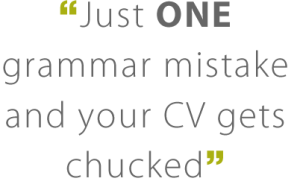77% of employers will immediately screen out a resume with typos or bad grammar. There are no excuses for errors on your resume, cover letter, or LinkedIn profile. Despite how far this technology has come, spellcheckers in your Word or Google Docs don’t catch everything. And this means way more spelling and grammar errors may be lurking on your resume.

These mistakes may seem little, but they convey a mountain of information about your candidature. These errors make a terrible first impression on hiring teams. And keyword misspellings may cause ATS (applicant tracking system) to ignore your application so you never make it past the first round.
That’s why your job search documents (i.e., your resume and cover letter) and your LinkedIn profile must be flawless. Have no fear if writing isn’t your strong suit, or you’re better with numbers than grammar? We’ll walk you through everything you need to know and do in today’s blog.
Resume spelling and grammar mistakes doesn’t give a good impression
Although it’s easy to make spelling and grammar errors, most hiring managers respond negatively to them—no matter how insignificant they may seem. To some, a single mistake may rule out a well-qualified candidate completely.
Unfortunately, I’d say more than half the resumes I come across contain misspellings and poor grammar. This is pretty unacceptable at any level, but most especially at the executive and C-suite levels.
So why do misspellings and incorrect grammar rank high on the list of resume mistakes costing your job? Because they show hiring teams that:
- Your communication skills need improvement
- You need attention to detail
- You’re not serious about the job


Do not trust the spell check along?
Get in the habit of using spell-check while writing your resume to catch and correct errors in the moment. Try to avoid relying on it solely because:
It doesn’t recognize the difference between a correct word and the right word
A spellchecker will only pick up words that are spelled wrong. Unlike a human reader, the software has no concept of your intention. So if you accidentally type “manger” instead of “manager,” spell check won’t be there to save you.
Spell check doesn’t correct homophones
Homophones are words that sound the same but have different meanings and spellings. Using one when you should be using the other can convey a lack of understanding or proofreading, neither of which you want.
The most commonly confused homophones on career documents include:
- Knew / new
- Personal / personnel
- Roll / role
- Weather / whether
- Counsel / council
- To, two, and too
- There, their, and they’re
- Lose / loose
- Your / you’re
- Accept / except
- Affect / effect


Know the most common resume spelling and grammar mistakes
- Mis-spelling the Company name of Hiring Manager’s name.
- Using the wrong verb tense
- Apostrophe use incorrectly


How to make your resume spelling and grammar errors free?
- Don’t rely on the spell check for everything
- Proofread your resume at least twice
- Try an online proofreading tool
- Read your resume out loud
- Read your resume backwards
- Hire a professional writer
Now you know what you stand to lose and the most common resume mistakes to avoid. So follow these steps to catch grammar mistakes and misspellings, and you’ll have blemish-free applications that wow and impress you employer.
www.qwikcv.com